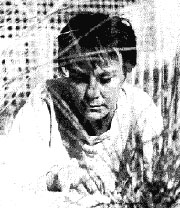“Nelle” Harper Lee was born on April 28, 1926, the youngest of four children of Amasa Coleman Lee and Frances Cunningham Finch Lee. She grew up in Monroeville, a small town in southwest Alabama. Her father was a lawyer who also served in the state legislature from 1926–1938. As a child, Lee was a tomboy and a precocious reader. After she attended public school in Monroeville she attended Huntingdon College, a private school for women in Montgomery for a year and then transferred to the University of Alabama. After graduation, Lee studied at Oxford University. She returned to the University of Alabama to study law but withdrew six months before graduation.
She moved to New York in 1949 and worked as a reservations clerk for Eastern Air Lines and British Overseas Airways. While in New York, she wrote several essays and short stories, but none were published. Her agent encouraged her to develop one short story into a novel. In order to complete it, Lee quit working and was supported by friends who believed in her work. In 1957, she submitted the manuscript to J. B. Lippincott Company. Although editors found the work too episodic, they saw promise in the book and encouraged Lee to rewrite it. In 1960, with the help of Lippincott editor Tay Hohoff, To Kill a Mockingbird was published.
To Kill a Mockingbird became an instant popular success. A year after the novel was published, 500,000 copies had been sold and it had been translated into 10 languages. Critical reviews of the novel were mixed. It was only after the success of the film adaptation in 1962 that many critics reconsidered To Kill a Mockingbird.
To Kill a Mockingbird was honored with many awards including the Pulitzer Prize for fiction in 1961 and was made into a film in 1962 starring Gregory Peck. The film was nominated for eight Academy Awards, including Best Picture. It actually was honored with three awards: Gregory Peck won the Best Actor Award, Horton Foote won the Best Adapted Screenplay Oscar and a design team was awarded an Oscar for Best Art Direction/Set Decoration B/W. Lee worked as a consultant on the screenplay adaptation of the novel.
Author Truman Capote was Lee’s next-door neighbor from 1928 to 1933. In 1959 Lee and Capote traveled to Garden City, Kan., to research the Clutter family murders for his work, In Cold Blood (1965). Capote dedicated In Cold Blood to Lee and his partner Jack Dunphy. Lee was the inspiration for the character Idabel in Capote’s Other Voices, Other Rooms (1948). He in turn clearly influenced her character Dill in To Kill a Mockingbird.
Harper Lee divides her time between New York and her hometown of Monroeville, Ala., where her sister Alice Lee practices law. Though she has published no other work of fiction, this novel continues to have a strong impact on successive generations of readers.
Harper Lee had many childhood experiences that are similar to those of her young narrator in To Kill a Mockingbird, Scout Finch:
Harper Lee’s Childhood
- She grew up in the 1930s in a rural southern Alabama town.
- Her father, Amasa Lee, is an attorney who served in the state legislature in Alabama.
- Her older brother and young neighbor (Truman Capote) are playmates.
- Harper Lee is an avid reader as a child.
- She is 6 years old when the Scottsboro trials are widely covered in national, state and local newspapers.
Scout Finch’s Childhood
- She grew up in the 1930s in a rural southern Alabama town.
- Her father, Atticus Finch, is an attorney who served in the state legislature in Alabama.
- Her older brother (Jem) and young neighbor (Dill) are playmates.
- Scout reads before she enters school and reads the Mobile Register newspaper in first grade.
- She is 6 years old when the trial of Tom Robinson takes place.

